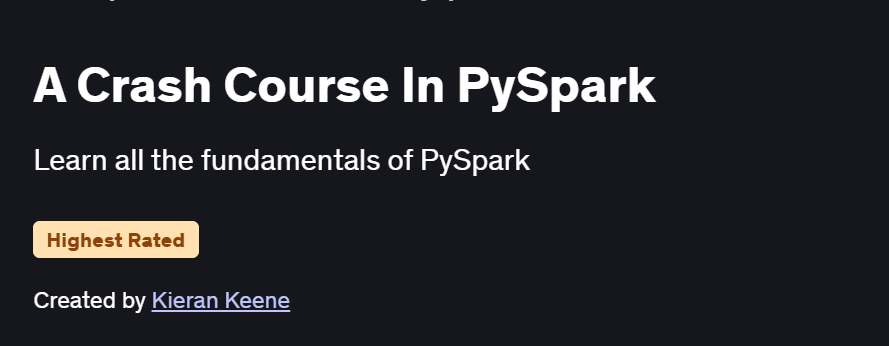What will you in A Crash Course In PySpark Course
- Install and configure PySpark locally and in a distributed cluster environment
- Load and manipulate large datasets using Spark DataFrames and SQL
- Perform complex data transformations with RDDs, DataFrame APIs, and Spark SQL
- Optimize Spark jobs through partitioning, caching, and broadcast variables
- Implement machine learning pipelines with Spark MLlib for classification, regression, and clustering
Program Overview
Module 1: Getting Started with Spark & PySpark
⏳ 30 minutes
Installing Spark, setting up
pysparkinteractive shell and Jupyter integrationOverview of Spark architecture: driver, executors, and cluster modes
Module 2: RDDs & Core Transformations
⏳ 45 minutes
Creating RDDs from files and in-memory collections
Applying transformations (
map,filter,flatMap,reduceByKey) and actions (collect,count,take)
Module 3: DataFrames & Spark SQL
⏳ 1 hour
Creating Spark DataFrames from CSV, JSON, and Parquet files
Using DataFrame operations (
select,filter,groupBy,join) and running SQL queries
Module 4: Performance Tuning & Optimizations
⏳ 45 minutes
Understanding the Catalyst optimizer and Tungsten engine
Repartitioning, caching, and using broadcast joins for large tables
Module 5: Advanced Data Processing
⏳ 1 hour
Working with window functions, UDFs, and complex types (arrays, structs)
Handling skew and writing efficient data pipelines
Module 6: Spark Streaming Essentials
⏳ 45 minutes
Processing real-time data with Structured Streaming
Applying streaming transformations and writing output to sinks
Module 7: Machine Learning with MLlib
⏳ 1 hour
Building ML pipelines: data preprocessing, feature engineering, and model training
Evaluating models and tuning hyperparameters for classification and regression
Module 8: Putting It All Together
⏳ 30 minutes
End-to-end ETL pipeline example: ingest, transform, analyze, and persist results
Best practices for debugging, logging, and monitoring Spark applications
Get certificate
Job Outlook
- PySpark skills are in high demand for Data Engineer, Big Data Developer, and Analytics Engineer roles
- Essential for organizations handling large-scale data processing in finance, retail, and technology
- Provides a foundation for advanced big-data frameworks (Databricks, Hadoop integration) and cloud services
- Prepares you for certification paths like Databricks Certified Associate Developer for Apache Spark
Specification: A Crash Course In PySpark
|





